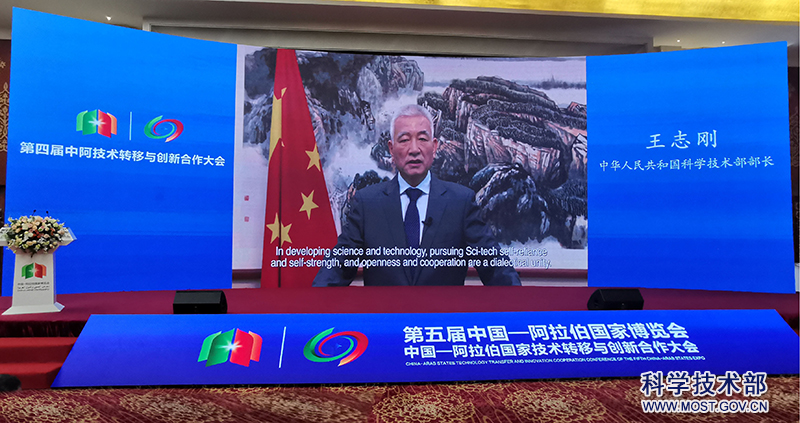On August 19, the 4th China-Arab States Technology Transfer and Innovation Cooperation Conference co-hosted by the Ministry of Science and Technology of China (MOST), the Secretariat of the League of Arab States and the Government of Ningxia Hui Autonomous Region opened in Yinchuan as an important part of the China-Arab States Expo. Minister of Science and Technology Wang Zhigang delivered a video address, Chairman of the Ningxia Autonomous Regional Committee of the CPPCC Cui Bo attended the conference, and Vice Chairman of the Autonomous Region Wu Xiuzhang attended and addressed the conference.

Wang Zhigang said that the announcement made by President Xi Jinping on the China-Arab strategic partnership at the opening ceremony of the 8th Ministerial Conference of the China-Arab States Cooperation Forum pointed the direction for China-Arab science, technology and innovation (STI) cooperation. The Chinese MOST attaches high importance to STI exchanges and cooperation with Arab states. Under the framework of the Belt and Road STI Cooperation Action Plan and the China-Arab Science and Technology Partnership Program, the Ministry has carried out extensive and deep-going STI exchanges and cooperation with Arab states. With the joint efforts of both sides, China-Arab STI cooperation has delivered concrete benefits for the people. The past three China-Arab States Technology Transfer and Innovation Cooperation Conference have seen the signing and implementation of several dozen cooperation projects and the establishment of a technology transfer cooperation network consisting of thousands of research agencies and companies at home and abroad, laying a solid foundation for results-oriented STI cooperation between China and Arab states. In fighting COVID-19, China and Arab states have actively worked together on vaccine research and development, expert exchanges and material assistance, providing a model of international cooperation on pandemic response and opening a new chapter of China-Arab science and technology cooperation.
Wang Zhigang stressed that in developing science and technology, pursuing self-reliance and promoting openness and cooperation are not in conflict with each other. China has never pursued innovation behind closed doors. Looking to the future, China is willing to work with Arab states to jointly plan for the development of science and technology, and inject strong impetus of innovation into the growth of China-Arab strategic partnership. Wang Zhigang also proposed a number of initiatives on deepening China-Arab STI cooperation, including further strengthening people-to-people exchanges and cooperation on science and technology, promoting the construction of joint research platforms, exploring cooperation on innovation and entrepreneurship, deepening cooperation in technology transfer, and working together to build an international STI governance system.
Foreign dignitaries including Assistant Secretary General of the League of Arab States Dr. Haifa Ghazala, Moroccan Minister of National Education, Vocational Training, Higher Education and Scientific Research Mr. Saaïd Amzazi, Minister of State in the Nigerian Federal Ministry for Science and Technology Mr. Mohammed Abdullahi and Ambassador of the Kingdom of Bahrain to China Dr. Anwar Alabdulla attended the conference and delivered video addresses. They applauded the progress of China-Arab cooperation in science and technology, offered suggestions and shared their visions for deepening science and technology cooperation between the two sides.
More than 2,500 representatives of science and technology authorities, research institutions, universities, technology transfer agencies and enterprises from China, Arab states and countries along the Belt and Road are participating in the conference both online and offline. Ten major technological achievements were released and 18 key cooperation projects signed. Six matchmaking sessions would be held during the conference, including the Presentation and Matchmaking Session for Key STI Cooperation Projects - Shanghai Special, the Seminar on China-Arab Geosciences Cooperation, and workshops on key technologies for clean energy and green low-carbon development, rural revitalization and the development of functional agriculture, STI cooperation between research institutes and universities, and the optimization of foreign-related legal and policy environment for STI.

